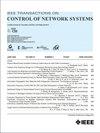Computationally Light Privacy Preservation of Matrix-Weighted Average Consensus
IF 4
3区 计算机科学
Q2 AUTOMATION & CONTROL SYSTEMS
引用次数: 0
Abstract
Multiagent consensus algorithms have emerged as foundational tools across a spectrum of applications, and matrix-weighted consensus ones are capable of characterizing cross-dimensional interdependence. Yet, their potential is often shadowed by a pressing concern: the privacy of agents' initial values, which frequently represent sensitive data or proprietary information. A computationally light privacy-preserving mechanism for matrix-weighted average consensus (MAC) algorithms is proposed in response to the concern of agents' privacy. In the mechanism, agents' states are first perturbed and then multiplied by the matrix weights before being sent to their neighbors. Both the perturbation and the matrix weight are neighbor-dependent, i.e., they may be selected to be different for different neighbors, and they can be selected independently to mask the true state of an agent. The proposed mechanism can simultaneously guarantee the privacy of initial values and accurate average consensus. The additional computational burden that an agent bears is only the addition of vectors in the same dimension as its state compared to the original MAC algorithm. Through practical case studies with a peer-to-peer transactive energy system, we demonstrate the tangible implications of safeguarding initial value privacy with the proposed mechanism.矩阵加权平均共识的轻计算隐私保护
多智能体共识算法已经成为一系列应用程序的基础工具,矩阵加权共识算法能够表征跨维度的相互依存关系。然而,它们的潜力往往被一个紧迫的问题所掩盖:代理初始值的隐私性,这些初始值通常代表敏感数据或专有信息。针对代理隐私问题,提出了一种计算量较小的矩阵加权平均共识算法隐私保护机制。在该机制中,智能体的状态首先被扰动,然后乘以矩阵权重,然后发送给它们的邻居。扰动和矩阵权值都是与邻居相关的,即对于不同的邻居,它们可以被选择为不同的,并且它们可以被独立地选择以掩盖代理的真实状态。该机制可以同时保证初始值的隐私性和准确的平均共识。与原始MAC算法相比,agent所承担的额外计算负担只是与其状态相同维数的向量的添加。通过点对点交易能源系统的实际案例研究,我们展示了使用所提出的机制保护初始值隐私的切实意义。
本文章由计算机程序翻译,如有差异,请以英文原文为准。
求助全文
约1分钟内获得全文
求助全文
来源期刊

IEEE Transactions on Control of Network Systems
Mathematics-Control and Optimization
CiteScore
7.80
自引率
7.10%
发文量
169
期刊介绍:
The IEEE Transactions on Control of Network Systems is committed to the timely publication of high-impact papers at the intersection of control systems and network science. In particular, the journal addresses research on the analysis, design and implementation of networked control systems, as well as control over networks. Relevant work includes the full spectrum from basic research on control systems to the design of engineering solutions for automatic control of, and over, networks. The topics covered by this journal include: Coordinated control and estimation over networks, Control and computation over sensor networks, Control under communication constraints, Control and performance analysis issues that arise in the dynamics of networks used in application areas such as communications, computers, transportation, manufacturing, Web ranking and aggregation, social networks, biology, power systems, economics, Synchronization of activities across a controlled network, Stability analysis of controlled networks, Analysis of networks as hybrid dynamical systems.
 求助内容:
求助内容: 应助结果提醒方式:
应助结果提醒方式:


